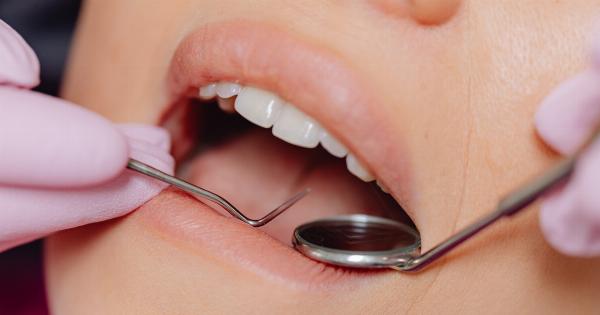Tooth sensitivity, also known as dentin hypersensitivity, is a common dental problem that affects a substantial number of individuals worldwide.
It is characterized by a sharp and temporary pain experienced in response to certain stimuli, such as hot or cold foods and beverages, sweet or sour substances, and even breathing cold air. Understanding the science behind tooth sensitivity can help individuals manage and prevent this uncomfortable condition.
The Structure of a Tooth
To comprehend the science of tooth sensitivity, it is crucial to understand the structure of a tooth. Each tooth consists of three layers: the enamel, dentin, and pulp. The enamel is the hard, outermost layer that protects the underlying layers.
The dentin, located beneath the enamel, comprises microscopic tubules or channels that lead to the pulp, which contains nerves and blood vessels.
Causes of Tooth Sensitivity
Several factors contribute to tooth sensitivity, including:.
1. Enamel Erosion
Enamel erosion occurs when the protective outer layer of the tooth is worn away, exposing the dentin and its sensitive nerves. This can be caused by acidic foods and beverages, aggressive brushing techniques, and certain medical conditions.
2. Gum Recession
Gum recession is a condition where the gum tissue surrounding the teeth pulls back, exposing the tooth roots. Since the roots do not have a protective layer of enamel, they are more susceptible to sensitivity.
3. Tooth Decay
Tooth decay leads to the formation of cavities, which can weaken the enamel and expose the underlying dentin.
4. Brushing Too Hard
Brushing your teeth with excessive force or using a hard-bristled toothbrush can cause the enamel to wear down over time, resulting in tooth sensitivity.
5. Teeth Grinding
Chronic teeth grinding, or Bruxism, can wear down the enamel and expose the dentin, leading to sensitivity.
6. Dental Procedures
Certain dental treatments, such as teeth whitening, scaling, or root planing, can cause temporary tooth sensitivity.
How Tooth Sensitivity Develops
When the dentin becomes exposed, either due to enamel erosion or gum recession, it becomes susceptible to external stimuli. The microscopic channels within the dentin allow these stimuli to reach the nerves within the pulp, triggering pain signals.
The nerve endings in the pulp are incredibly sensitive and respond rapidly to changes in temperature, pressure, and chemical composition.
Managing and Preventing Tooth Sensitivity
Various strategies can help manage and prevent tooth sensitivity:.
1. Use a Desensitizing Toothpaste
Desensitizing toothpastes contain compounds that help block the sensory nerves in the dentin, reducing sensitivity. These toothpastes are available over-the-counter and can provide relief with regular use.
2. Avoid Acidic Foods and Beverages
Limit the consumption of highly acidic foods and drinks, such as citrus fruits, soda, and carbonated beverages. If consumed, rinse your mouth with water afterward to minimize the acid’s impact on the teeth.
3. Practice Gentle Brushing Techniques
Brush your teeth using a soft-bristled toothbrush and a gentle circular motion. Avoid aggressive scrubbing, as it can contribute to enamel erosion and gum recession.
4. Use Fluoride Mouthwash
Rinsing your mouth daily with a fluoride mouthwash can help strengthen the enamel and reduce tooth sensitivity.
5. Wear a Night Guard
If you suffer from bruxism, wearing a night guard can help protect your teeth from grinding and prevent enamel wear.
6. Visit Your Dentist Regularly
Scheduling regular dental check-ups allows your dentist to identify any signs of tooth sensitivity and take appropriate measures to address the underlying causes.
Conclusion
Tooth sensitivity can significantly impact one’s quality of life, making it essential to understand its science and take preventive measures.
By maintaining good oral hygiene practices, avoiding potential triggers, and seeking professional dental care, individuals can effectively manage and prevent tooth sensitivity, ensuring a healthy and comfortable smile for years to come.




























